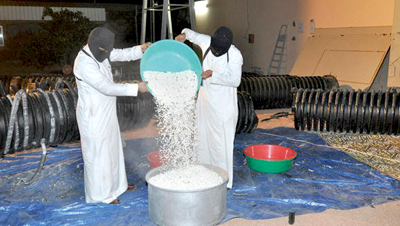Jeddah, Jan 10: Anti-narcotics forces in Madinah foiled the smuggling of 623,000 Captagon pills. The drug consignment, which was coming from Tabuk and heading for Jeddah, was intercepted in Madinah and the alleged smuggler arrested.
 Meanwhile, customs officers at the Prince Naif bin Abdulaziz Airport in Qassim stopped an attempt by a passenger to smuggle 21,000 Captagon pills into the Kingdom. The airport’s customs director general, Walid Al-Fouzan, said an officer found the tablets wrapped in foil in the passenger’s suitcase.
Meanwhile, customs officers at the Prince Naif bin Abdulaziz Airport in Qassim stopped an attempt by a passenger to smuggle 21,000 Captagon pills into the Kingdom. The airport’s customs director general, Walid Al-Fouzan, said an officer found the tablets wrapped in foil in the passenger’s suitcase.
The demand for Captagon appears to increase with the approach of school exams. The Interior Ministry has registered cases against people who promoted the pills under the pretext that they help students remember and stay awake to study and get higher marks. But studies have shown that the drugs do just the opposite.
Abdul-Illah bin Mohammad Al-Sharif, assistant-director of Narcotics Prevention Affairs and an international consultant, said narcotics is a problem with young people. “There are many reasons for consuming drugs such as lack of religious deterrence, family break-up, psychological problems at childhood and bad friends and their influence,” he said.
Two weeks before the exams begin, drug dealers become more active. According to research papers published by the College of Pharmacology at King Saud University and the Toxicology Center, the regular consumption of Captagon pills between three and six months kills millions of cells in the brain.
Some 60 percent of addicts in Al-Amal hospitals in Riyadh, Jeddah and Dammam and the rehab center in Al-Qasim are addicted to Captagon, according to the research findings.
Government agencies regularly conduct awareness programs to educate families and young people about the harmful effects of drugs.





Comments
Add new comment